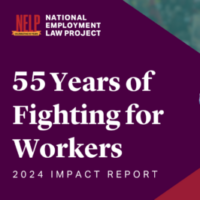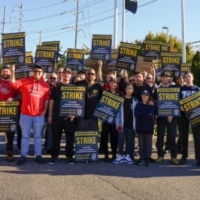Stronger Together as We Move Forward
As we move into 2025, we face an administration poised to undermine workers’ rights and roll back progress on racial and economic justice. These threats demand bold action, and NELP is ready. We are grounded in our strengths and relationships with worker leaders, community groups, state partners, labor, policymakers, and national networks. Together we are building a good-jobs economy to ensure that every single job is a good job, and everyone who wants a job can get one. As a thought leader, connector, and policy expert, NELP will meet this moment and take decisive action in 2025 to:
-
Strengthen Local Democracy to Ensure Workers’ Rights
-
Deepen Movement Infrastructure and Support Worker Organizing
-
Secure Worker Protections for Economic Resilience
Strengthen Local Democracy to Ensure Workers’ Rights
As the federal government undermines workers’ rights, state and local governments can step up as vital protectors of democracy and economic justice. Together with our partners, we have identified key protections that state policymakers can adopt to secure and expand federal rights for workers. We will pursue state and local campaigns to raise the wage floor, strengthen contracted workers’ rights and employer accountability, make workplaces safer, advance just cause rules, promote heat standards, improve unemployment insurance (UI) benefits, and address the impact of technology and AI on workers.
Corporations are raising prices to boost their record profits, leaving workers to bear the burden by working full-time or multiple jobs just to get by. People across political lines recognize this system is unfair and strongly support raising wages. In 2024, we supported our partners and allies in the states of Alaska and Missouri as they led successful campaigns to raise the minimum wage and secure paid sick leave policies. In Alaska, the minimum wage will increase to $15 by 2027, and in Missouri it will increase to $15 by 2026. The momentum continues after more than a decade since the Fight for $15 and a union movement began. Sixteen states have increased the wage floor to $15 or higher per hour, and a record 88 jurisdictions will see their minimum wages go up in 2025. Following these successes, in 2025 we will support workers’ demands in states and localities in Colorado, Minnesota, New York, and Virginia.
Over 26 million people—about one in six U.S. workers—are employed as independent contractors, temp workers, or through contract firms. Misclassification erodes workers’ rights, slashes wages and benefits, harms fair competition, and reinforces racial and gender inequities. Temp workers, too, often do the same jobs as permanent employees but earn less, receive fewer benefits, and have limited chances for full-time employment. In 2025, we will continue exposing corporate exploitation of misclassified workers, including app-based workers, and fighting for temp workers’ rights through partnerships with campaigns in California, Colorado, Connecticut, New Jersey, New York, and Tennessee.
Corporations and policymakers have failed to address the dangers millions of workers face from natural disasters and extreme weather, risks that are worsening due to climate change. In 2025, we are supporting campaigns in Arizona, California, New Jersey, New Mexico, and New York to hold employers accountable and ensure worker safety is prioritized in the face of climate threats. These efforts center on workers’ needs and will set a model for other states and communities. We will also leverage our UI expertise and recent success in reforming and extending disaster unemployment assistance (DUA) application deadlines to enhance this program’s responsiveness to the growing challenges of climate change disasters.
Deepen Movement Infrastructure and Support Worker Organizing
A strong workers’ rights movement is essential to a thriving democracy. As federal threats to workers’ rights grow, we are strengthening partnerships and coalitions to build a more powerful workers’ rights movement. We are fighting against the exploitation of undocumented workers by unscrupulous employers that use workers’ immigration status to undermine their rights and organizing efforts. We are bringing state and national allies together to share knowledge, resources, and skills to amplify our collective impact. In 2025, we are convening the legal community focused on workers’ rights, including worker center lawyers. We are also leading a network focused on UI reform to ensure the program supports jobless workers during economic uncertainty. Our national gig worker table brings together advocates, organizers, researchers, and experts to address the challenges faced by gig workers.
Worker centers are member-based spaces where workers organize to build long-term power and tackle workplace issues. These organizations lead workplace organizing and policy campaigns, often with limited resources and staff. Our Worker Center Support Program began in 2016 to provide strategic and infrastructure support and to drive systemic change. Given the hostile environment, we are building on our deep and trusted relationships by preparing worker centers for increased scrutiny, while continuing to support power-building efforts. In 2025, we will work with 75 worker centers, with a focus on the South and Midwest. We are providing thought partnership, policy development, and strategic campaign planning. We are creating spaces for worker centers to share resources and learn together, and to prepare for defensive and responsive work. Additionally, we are continuing to support innovative organizational models to enhance direct worksite organizing.
Secure Worker Protections for Economic Resilience
As we prepare for a federal agenda prioritizing profits over people, in 2025 we will defend federal labor standards from efforts to weaken them, opposing attempts to relegate workers to lower pay, overwork, and more dangerous conditions. This includes defending child labor protections, securing health and safety on the job, challenging harmful federal nominations, and resisting measures that erode federal workers’ rights or the ability to provide vital public services. Through legal advocacy and coalition work, we will fight actions that undermine worker protections and elevate these issues to the public and to policymakers.
To counter misinformation and the powerful forces stoking anti-immigrant sentiment and racism to divide workers, we will maintain a publicly accessible policy tracker, NELP’s Worker Policy Watch, to expose anti-worker policies and provide accurate, actionable information to journalists, advocates, and policymakers. We will amplify worker leaders’ voices to highlight their role in transforming unjust systems, advancing a good-jobs economy, and shaping public discourse. We will also continue to push for federal legislation to raise labor standards, support union organizing, reduce employment barriers for justice-impacted individuals, and hold corporations accountable. Our goals for these efforts will be longer term; we are building a base of federal champions and will be drawing a sharp contrast with anti-worker efforts.
We are working to ensure that unemployment insurance (UI) systems and labor protections are robust enough to withstand potential economic challenges and provide security for workers and families. In 2025, our efforts will include supporting campaigns to increase benefit duration, coverage, and amounts, as well as expanding access to striking workers. We will be working with partners in California, New York, Oregon, Virginia, and Washington. Our goal is to ensure UI remains a lifeline for unemployed workers, helping them sustain their families while seeking new job opportunities.



